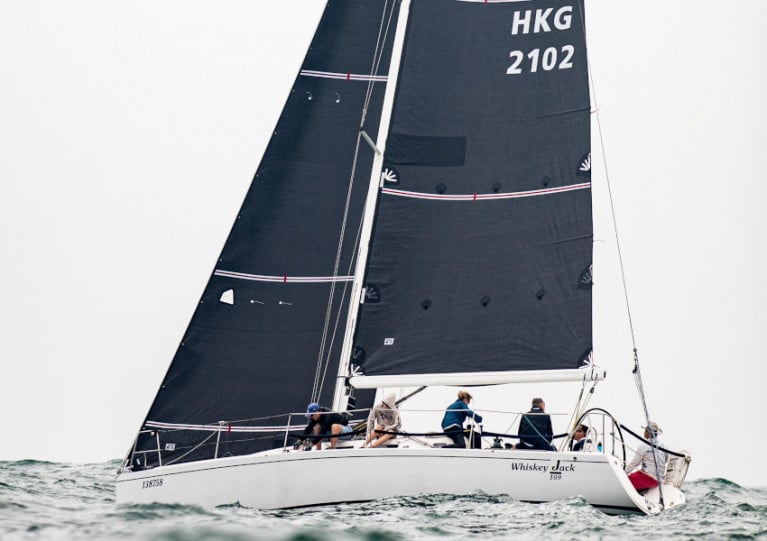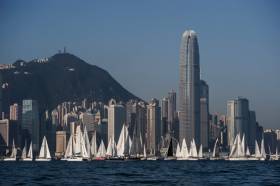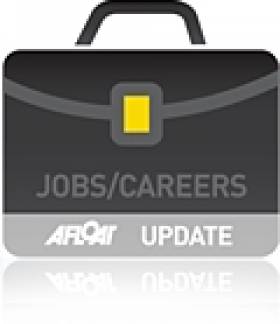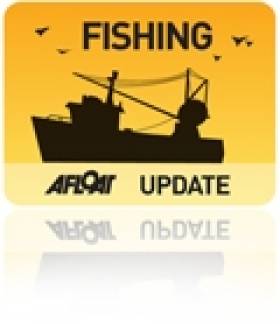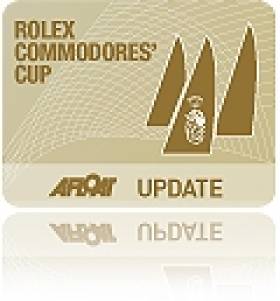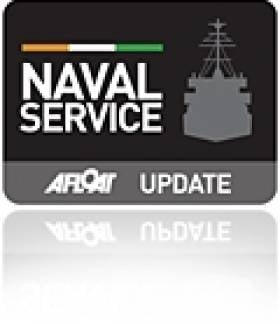Displaying items by tag: Hong Kong
In light of the coronavirus situation effecting Ireland, Afloat.ie got in touch with Barry Hayes from UK Sailmakers Ireland, who has lived in three continents, to share his experience in Asia and what’s going on with Covid-19 in Hong Kong’s sailing community.
Barry says: “Having lived in HK for so long, I can tell you they have vast experience with viruses! For example, HK has had influenza, swine flu and the SARS virus. They hit very hard in HK and the people responded to it.
“Yes, clubs closed and people lost jobs. Racing stopped for a short time. It returned and they recovered quickly.
This year, Covid-19 really hit home in Hong Kong around Chinese New Year festivities on 24 January. “When HK started to go into lockdown schools were closed, and still are. From there all racing was stopped and the clubs closed.
“But this time the HK government felt it was better to keep the clubs going and get people out sailing. So they didn’t let the clubs stay closed for long — pushing them to reopen as soon as a low in the virus came so people got out and got active in the sun.
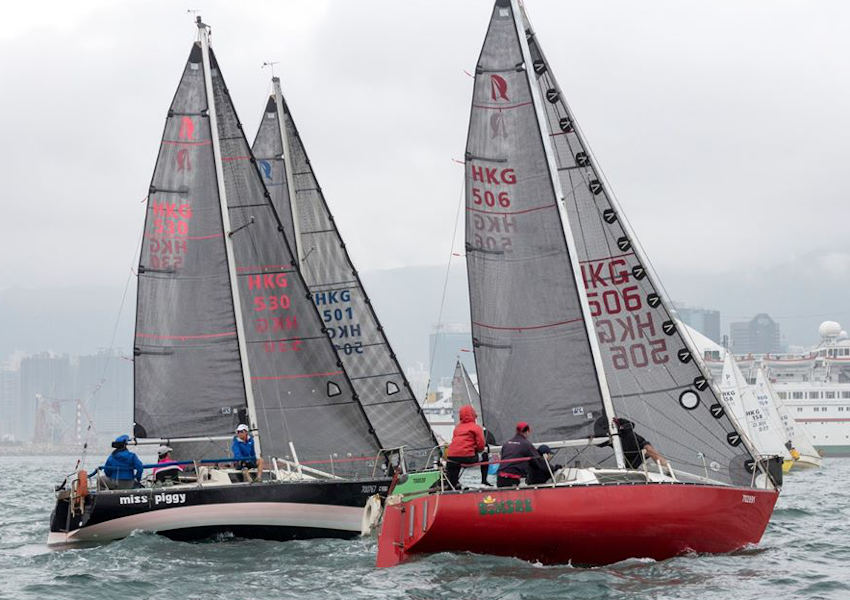 Racing in Kowloon Bay at St James’ Place Ladies Helm Day on 8 March | Photo: RHKYC/Guy Nowell
Racing in Kowloon Bay at St James’ Place Ladies Helm Day on 8 March | Photo: RHKYC/Guy Nowell
The upside of this, Barry says, is that “there is light at the end of the tunnel”.
“Last weekend HK returned to full racing. Just eight weeks after the virus hit the hardest. They held the Hong Kong IRC Nationals on 14-15 March.
“This virus will affect us but we will rebound. I am sure, having lived in both countries, we need to work super hard to reduce the contact between humans as much as we can. And Ireland seems to be working hard on doing this.
“I know in the short term it seems impossible, but I can tell you from experience we will be back racing with a delayed season.
One of the boats sailing in last week’s HK IRC nationals was Nick Southward’s modified J109, Whiskey Jack.
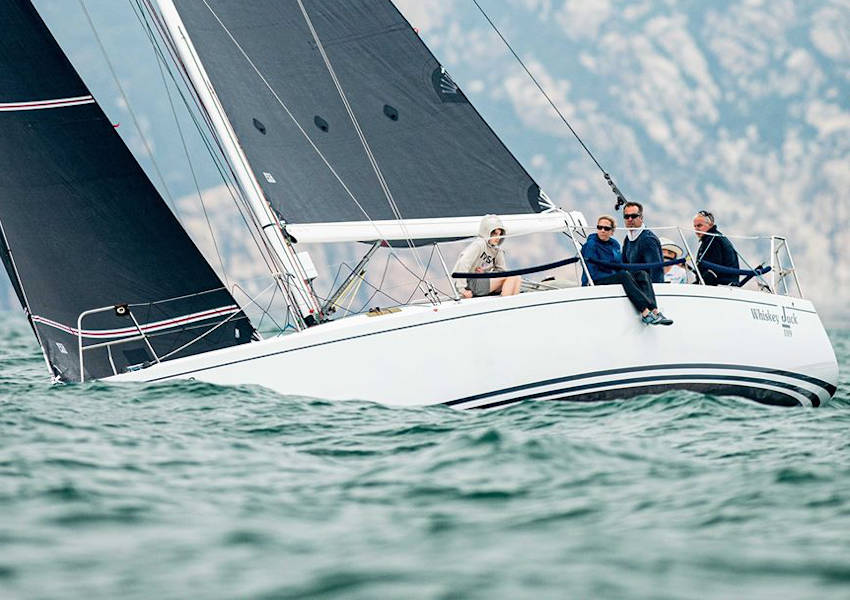 Whiskey Jack on day 3 of the Hong Kong IRC Nationals | Photo: ABC/Takumi Furuichi
Whiskey Jack on day 3 of the Hong Kong IRC Nationals | Photo: ABC/Takumi Furuichi
Nick, of the Royal Hong Kong Yacht Club and who will be chartering Imp for Cork Week, said that with border restrictions imposed early on, the infection rate in HK has been very slow.
“The threat now appears to be infections from people flooding back into HK from Europe and the US, but there is now a travel restriction in place and all who arrive have to go into a compulsory fourteen day quarantine at home. This monitored by a smart bracelet, an app and the police to ensure enforcement.”
Beyond that, Alex Johnson, manager of HK’s Aberdeen Yacht Club, reports that life is “sort of normal, but restricted in terms of what you can do”.
“The population is also very clued-up after SARS which really has helped to combat the virus. Everyone wears face masks, liberally uses hand sanitiser and luckily the toilet roll supply is now constant!
“HK is not out of the woods yet but the infection rate on the mainland has dropped dramatically so everyone is hopeful.”
Ireland Women Qualify for A Finals at World Coastal Championships
#Rowing: Five Ireland entrants in the women’s solo single made it through heats into Sunday’s A Final of the World Coastal Rowing Championships in Hong Kong. Miriam Sheehan of Castletownbere placed best, taking third in the first heat, one place ahead of Sionna Healy. The Arklow sculler was one of three from her club to make it to the A Final in this class. Both women’s coxed quadruples, from Belfast and a composite of Castletownbere and Myross, also qualified for the A Final.
The Ireland men’s crews found the going tougher. Only the top five in the heats of the men’s double were guaranteed places in the A Final. John Whooley and Alan Goodison finished sixth in their heat - making it through. The three other Ireland crews missed out.
World Coastal Rowing Championships, Hong Kong – Day One, Heats (Ireland crews)
Men
Double (Five to A Final) – Heat One: 6 Arklow 19:04.39; 10 St Michael’s, Dublin 21:28.54.
Heat Three: 8 Kilmacsimon/Ring 21:15.37; 11 Courtmacsherry 22:53.45.
Women
Quadruple, coxed (Eight to A Final) – Heat One: 7 Belfast BC 19:33.28.
Heat Two: 7 Castletownbere/Myross 20:40.31.
Solo (Eight to Final) – Heat One: 3 Castletownbere (M Sheehan) 22:07.48; 4 Arklow (S Healy) 22:16.07; 7 Galley Flash (N Hayes) 23:13.68; 8 Arklow (MA Kent) 24:41.77.
Heat Two: 6 Arklow (X Jordan) 24:02.30.
Hong Kong To Debut As Volvo Ocean Race Stopover Destination
#VOR - Hong Kong will host the Volvo Ocean Race for the first time when the event visits in February 2018 during the 13th edition.
In a press conference today (Wednesday 13 April), VOR organisers announced a unique collaboration with the Hong Kong Sailing Federation to bring the race to Hong Kong’s Victoria Harbour.
It is set to be the largest world-class sailing event ever staged in Hong Kong, already one of the world’s most prestigious sailing destinations.
The world’s premier offshore race will transform the old airport in Kai Tak, and introduce residents of Hong Kong to a wide range of race-related activities geared to educate as well as entertain both existing fans and newcomers to the race.
An in-port race will also be held in the port before the boats leave for the next leg.
Anthony Day, Council Member of the Hong Kong Sailing Federation, said: “This will go down in history as a milestone event for Hong Kong sailing and will provide a wonderful platform for us to engage more Hongkongers in the sport of sailing."
Antonio Bolaños Lopez, acting CEO of the Volvo Ocean Race before Mark Turner takes up the role later this year, added: “I am thrilled that the race is visiting one of the most beautiful ports in the world for the first time.
"We are delighted to welcome Hong Kong to the Volvo Ocean Race family and know that we will have a stopover that will be one of the highlights of the 2017-18 edition.
“I would like to pay special tribute to the Hong Kong Sailing Federation and the Hong Kong government for making our dreams of bringing the race here a reality.”
Hong Kong brings the confirmed list of stopovers so far for the Volvo Ocean Race 2017-18 edition to nine, which includes Alicante, Auckland, Cape Town, Cardiff, Newport in Rhode Island, Lisbon, Gothenburg and The Hague, which will host the finale after a successful pit-stop on the final leg of the 2014-15 race.
The Hong Kong stopover will mark the fourth time the Volvo Ocean Race has visited China, after Qingdao in the 2008-09 race and Sanya in the 2011-12 and 2014-15 competitions.
Race Coach / Bosun Vacancy in Hong Kong
#jobsinboats – The Royal Hong Kong Yacht Club, one of the oldest sailing and rowing clubs in Hong Kong, is looking for a talented and youthful dinghy sailor to fill the post of Race Coach / Bosun.
This is a full-time contract based in Hong Kong commencing July or August 2015. Reporting to the Middle Island Sailing and Marine Manager, the successful applicant will coach up and coming cadets to higher levels of racing expertise. Classes of boats include the J80, Optimist, Laser, 420 and 29er. Coaching and mentoring at international events will be involved. Off-water there will be basic fibreglass repairs and maintenance of sailing craft and RIB's to be completed. Middle Island has a clubhouse, sailing academy, hardstand, marina and launching areas serviced by a regular club ferry.
We are looking for people with:
- Extensive dinghy racing experience.
- Graduation from an internationally recognised sail training academy.
- Race Coach qualification is essential with Keel Boat Instructor preferred.
- Excellent interpersonal, team and leadership skills.
- Fibreglass repair experience and confidence to install small boat rigs and deck equipment to a professional standard.
- Flexibility to work weekends and midweek shifts.
We offer attractive remuneration and excellent fringe benefits to the right candidate. Closing date for applications is 15 June 2015. Interested parties should submit a comprehensive CV together with a recent photograph to The Human Resources Manager, Royal Hong Kong Yacht Club, Kellett Island, Causeway Bay, Hong Kong or e-mail to [email protected]
Hong Kong Bans Donegal Oysters Over Food Poisoning Scare
#Seafood - Donegal's oyster industry has been hit by an import ban in Hong Kong over an outbreak of food poisoning.
According to The Irish Times, food safety investigators in the Chinese territory were notified by Irish authorities two weeks ago that the presence of norovirus was confirmed at a raw oyster processing plant in the north-eastern county that services the crucial Asian market.
Hong Kong subsequently banned the import of raw oysters from Donegal "for the sake of prudence". More HERE.
Ireland Thankful to Escape Favourites Tag for Commodore's Cup 2012
Ireland's 2010 Commodore's Cup winning captain showed his relief at the news that Hong Kong have been tipped as favourites for next July's event, The Irish Times reports.
The announcement was made this week at the Royal Ocean Racing Club (RORC) in London, and should lift a burden off an Irish squad which has long suffered under the weight of being pre-event favourites.
Ireland's concerns instead have turned to whether a team can even be assembled for next summer's event in light of the difficult economic environment - and despite the RORC opening the rating bands to allow for more flexible combinations of boat sizes.
As previously reported on Afloat.ie, the Irish Cruiser Racing Association (ICRA) is seeking expressions of interest to form an Irish team and remains hopeful of mounting a serious defence of the title won by last year's Anthony O’Leary-captained squad.
The next Commodore's Cup - which also has a new title sponsor in Brewin Dolphin - takes place from 21 to 28 July 2012 in Cowes.
Navy Escort Detained Trawler to Castletownbere
Less then a month ago the Naval Service detained a Northern Irish registered fishing vessel the Lynn Marie seven miles east off Bray Head. Onboard was a crew of 4 UK nationals who were taken into custody to the Gardai after the trawler was escorted by the CPV L.E. Orla to Dun Laoghaire Harbour. To read more about this detention click here.
Ironically the L.E. Orla was a former Royal Naval vessel, HMS Swift (P241) which was deployed on her first assignment to the Hong Kong Patrol Squadron for a four-year period. In 1988 Margaret Thatcher's Conservative Party Government disposed HMS Swift and HMS Swallow (P242) to the Irish Naval Service. The pair were built by Hall Russell Shipyard of Aberdeen as part of an eight 'Peacock' class coastal patrol vessel (CPV).
The 'Peacock' pair were commissioned into the Naval Service and renamed L.E. Orla (P41) and L.E. Ciara (P42) in a ceremony attended by An Taoiseach Charles J. Haughey at the Naval Base in Haulbowline, Cork Harbour.
This weeks' detention is the second conducted by the Naval Service in 2011. Last year the Naval Service carried out 1,666 vessel boardings which resulted in 70 warnings and eight detentions.
- Irish Naval Service
- Cork Harbour
- Northern Ireland
- Haulbowline
- castletownbere
- naval service
- LE Niamh
- Royal Navy
- Ports and Shipping News
- Lynn Marie
- Fishery Breaches
- Fishery Detention
- Fishing Trawler
- Peacock Class
- Hong Kong
- Hall Russell
- Appledore Shipbuilders
- LE Orla
- HMS Swift
- LE Ciara
- HMS Swallow
- Margaret Thatcher
- Conservative Party
- An Taoiseach
- Charles J. Haughey
- Naval Base


























